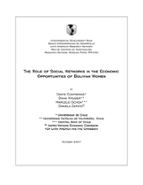The Role of Social Networks in the Economic Opportunities of Bolivian Women
Date
Oct 2007
This paper explores the role of social networks in determining the participation of Bolivian women in income-generating activities. The empirical analysis intends to explore the impact of this new social variable on the economic choices of women and its relative importance with respect to other individual characteristics, such as education or number of children in the household. The empirical framework defines social network as the average outcome of people living in the same neighborhood. Estimation results suggest that social networks are an effective channel through which women obtain access to salaried jobs, which are of higher quality than jobs as self-employers. In contrast, their male counterparts find a positive but statistically insignificant effect from social networks. When considering the sex of the contact, it is found that women in urban areas benefit from other women being employed, while in rural areas women benefit from the presence of more employed male workers.



